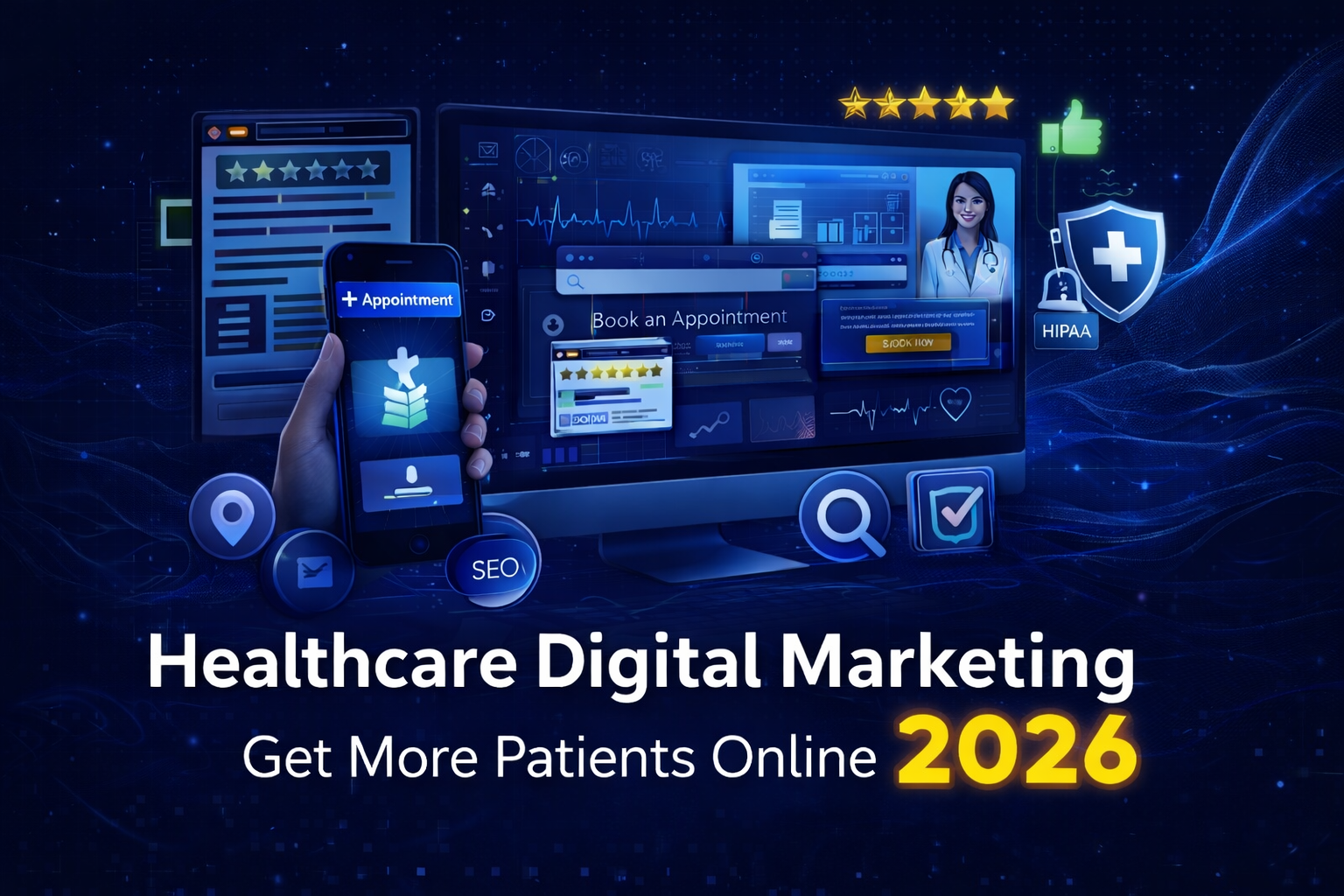Healthcare has changed. Patients don’t “discover” providers the old way anymore.
They search symptoms, compare providers, read reviews, check your website, and decide whether you feel trustworthy — before they ever call.
If your digital presence is weak, you’re not just missing traffic. You’re losing patients to the provider who looks safer, clearer, and more professional online.
This guide breaks down what actually works in healthcare digital marketing in 2026, and how to build a system that earns trust and drives consistent patient growth.
TL;DR — What Wins in 2026
- Your website is the trust engine (not just a brochure) → start with Website Design for 2026
- Local search + reviews drive most appointment intent → build a real SEO foundation via Technical SEO Checklist 2026
- Speed + mobile matter more than most clinics realize → Mobile Optimization 2026 and Full Speed Optimization Guide 2026
- Accessibility + security affect trust (and risk) → ADA Website Compliance 2026 + Website Security Monitoring Service
- If you’re not tracking conversions, you’re guessing → Website Analytics & Tracking 2026
Table of Contents
- Why Healthcare Marketing is Different in 2026
- The “Digital Front Door” Patients Judge
- Local SEO: The #1 Patient Acquisition Channel
- Content That Builds Trust (Without Overstepping)
- Reviews + Reputation: The Silent Dealbreaker
- Paid Ads: When They Work (And When They Waste Money)
- Compliance, Accessibility, and Trust Signals
- Conversion Optimization: Turn Visits Into Calls
- Tracking + Measurement: Prove ROI
- What to Do Next
1) Why Healthcare Marketing is Different in 2026
Most industries can sell with hype. Healthcare can’t.
Healthcare marketing is about trust, clarity, and reducing uncertainty. Patients want to know:
- Are you legitimate?
- Are you safe?
- Do you understand my situation?
- Can I book fast?
- Do other people trust you?
That means your strategy must be built around a strong website foundation — not random posting.
If you’re trying to grow patient volume, start by treating your site as your home base, not a side project:
Website Management Cost 2026
2) The “Digital Front Door” Patients Judge
Patients decide in minutes whether they trust you. Your website needs to answer:
- What do you do (specifically)?
- Who is it for?
- What happens next?
- How do I book?
- Why should I trust you?
If the site is slow, messy, outdated, or confusing, your marketing spend doesn’t matter — patients bounce.
Use this as the baseline:
3) Local SEO: The #1 Patient Acquisition Channel
Most healthcare patient intent is local and urgent. People search:
- “urgent care near me”
- “dermatologist in [city]”
- “pediatric dentist [city]”
- “therapy for anxiety [city]”
If you’re not showing up, you’re not in the decision set.
Local SEO priorities:
- Google Business Profile optimized and active
- consistent NAP (name/address/phone) across listings
- review velocity + responses
- service pages that match actual search terms
- technical SEO foundation so Google can crawl and trust your site
Start here:
4) Content That Builds Trust (Without Overstepping)
Most healthcare content fails because it’s either:
- too generic (adds no value), or
- too clinical (no patient empathy), or
- too bold (risk + compliance issues)
You don’t need to “diagnose online.” You need to educate, reduce uncertainty, and guide next steps.
Content that works:
- “What to expect” pages (first visit, procedure, recovery)
- symptom education (when to seek care, warning signs)
- treatment overviews (benefits, risks, FAQs)
- insurance/payment clarity
- location pages (service + city + trust signals)
To keep content consistent and compounding:
Content Management & Updating Strategy 2026
5) Reviews + Reputation: The Silent Dealbreaker
Patients will forgive a lot. They won’t forgive uncertainty.
If reviews are weak, outdated, or unanswered, patients choose the competitor with clearer social proof.
Reputation basics:
- ask for reviews consistently (system, not “whenever”)
- respond to all reviews (calm, professional, HIPAA-safe)
- highlight proof on-site (testimonials, outcomes, process)
6) Paid Ads: When They Work (And When They Waste Money)
Ads can scale fast — but only if your site converts.
If your landing page is slow, confusing, or missing trust signals, you’ll pay for clicks that never become patients.
Before you spend hard on paid:
- fix speed + mobile
- tighten your service page messaging
- add clear booking CTAs
- track calls + forms properly
Start with:
7) Compliance, Accessibility, and Trust Signals
This is where healthcare sites often get sloppy.
Patients judge trust by details:
- secure browsing (SSL done correctly)
- no malware warnings
- accessibility that works for real users
- clear privacy language
- no sketchy popups
Support pages:
If you want deeper prevention (not just detection), keep this aligned with your security pillar too:
Website Security Hardening 2026
8) Conversion Optimization: Turn Visits Into Calls
Traffic doesn’t pay bills. Conversions do.
Healthcare sites should optimize for:
- calls
- appointment requests
- eligibility checks / consultations
- direction requests
- insurance questions
Fix the common conversion killers:
- unclear primary CTA
- weak service page structure
- too many menu choices
- no proof near the CTA
- no tracking → no feedback loop
Use this as your conversion checklist:
Conversion Optimization 2026
9) Tracking + Measurement: Prove ROI
If you can’t answer these questions, you’re guessing:
- which pages drive calls?
- which keywords drive bookings?
- which campaigns produce real patients?
- where do users drop off?
Tracking isn’t optional in 2026.
Start here:
Website Analytics & Tracking 2026
10) What to Do Next
If you want real growth (not random activity), do this in order:
- Build a strong website foundation
Website Design for 2026 - Lock technical SEO + speed + mobile
Technical SEO Checklist 2026
Full Speed Optimization Guide 2026
Mobile Optimization 2026 - Set tracking so you can scale intelligently
Website Analytics & Tracking 2026 - Optimize conversion paths and CTAs
Conversion Optimization 2026 - Maintain content like an asset, not a chore
Content Management & Updating Strategy 2026
Ready to Improve Patient Growth Without Guessing?
At The Clay Media, we help healthcare brands build websites and marketing systems that earn trust and convert.
👉 Book a consultation: https://theclaymedia.com/contact/
📞 949-444-2001
📧 Team@theclaymedia.com





